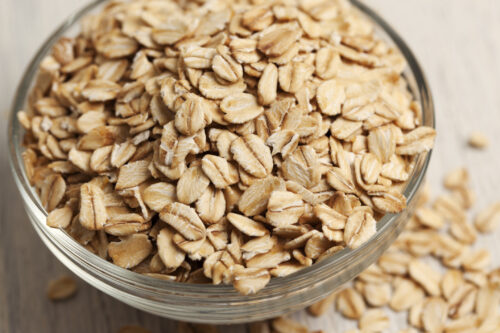
Is porridge really good for us or has ‘big breakfast’ been pulling the wool over our eyes? HFG dietitian Jess Burvill investigates.
You may have seen influencers on social media dismissing oats as ‘horse food’. Some critics claim oats contain ‘anti-nutrients’ that affect how we absorb food and promote inflammation, while others worry about their effect on blood sugar. Let’s look at the science.
RED FLAG CLAIMS
- Oats will spike your blood glucose
- Oats contain lectins which cause inflammation
- Oats contain phytates which block nutrient absorption
Do oats spike blood sugar?
Oats are a carbohydrate, so they naturally raise blood sugar levels – but this is a normal response that triggers our body to release insulin, allowing the sugar into our cells to be used as energy. Unlike more refined carbs, oats are rich in fibre and protein and have a lower glycaemic index (GI), which leads to a steadier release of glucose for lasting energy and satiety.
Steel-cut and rolled oats have a low to moderate GI, while instant oats digest faster and raise blood glucose more quickly.
Pairing oats with protein, healthy fats or extra fibre (eg, nuts, seeds or yoghurt) slows digestion and helps balance blood sugar.
Should you be concerned about lectins in oats?
Lectins are plant proteins found in many legumes, vegetables and grains, including oats, which some people believe contribute to inflammation and gut issues.
While animal studies suggest large amounts of isolated and raw lectins can damage the gut, human studies show when eaten as part of food in cooked form, there is no strong evidence that lectin- rich foods cause inflammation, leaky gut or nutrient absorption issues. Most harmful lectins are deactivated by cooking and processing, so oats – whether rolled, steel-cut or instant – contain negligible amounts. Despite misconceptions, oats are beneficial for gut health. Their beta-glucan content acts as a prebiotic, nourishing beneficial gut bacteria and promoting short-chain fatty acids, which help reduce gut inflammation.
Do phytates in oats block nutrient absorption?
Phytic acid, or phytate, is a natural compound found in whole grains, seeds, legumes and nuts. It can bind to minerals like iron, zinc, calcium and magnesium, potentially reducing their absorption. While oats do contain phytic acid, its effect on mineral absorption is not significant for most people, especially in a balanced diet. The health benefits of oats outweigh any potential drawbacks of phytates. Soaking oats overnight or cooking them can also help break down phytates, making the nutrients in oats more accessible.
The verdict: Oats are for humans too The idea that oats are ‘unhealthy’ is not supported by science. Extensive research shows that oats offer many health benefits like lowering cholesterol, regulating blood pressure, supporting weight management, boosting immune function, and reducing the risk of death from cancer and heart disease. Next time someone says, ‘Oats are for horses’, you can confidently reply that they’re a great choice for humans too!
Article sources and references
- Chen et al. 2021. The Role of Oat Nutrients in the Immune System: A Narrative Review. Nutrients. 13(4):1048
- Hou et al, 2015. The Metabolic Effects of Oats Intake in Patients with Type 2 Diabetes: A Systematic Review and Meta-Analysis. Nutrients. 7(12):10369-87
- Kim et al. 2021. Effects of Oats (Avena sativa L.) on Inflammation: A Systematic Review and Meta-Analysis of Randomized Controlled Trials. Front Nutr. 8:722866
- Nciri et al. 2015. Toxicity Assessment of Common Beans (Phaseolus vulgaris L.) Widely Consumed by Tunisian Population. J. Med. Food. 18:1049–1064
- Singh RP and Bhardwaj A. 2023. β-glucans: a potential source for maintaining gut microbiota and the immune system. Front Nutr. 10:1143682
- Wehrli et al. 2021. Oat Intake and Risk of Type 2 Diabetes, Cardiovascular Disease and All-Cause Mortality: A Systematic Review and Meta-Analysis. Nutrients. 13(8):2560
- Xi et al. 2023. Effect of Oat Consumption on Blood Pressure: A Systematic Review and Meta-Analysis of Randomized Controlled Trials. J Acad Nutr Diet. 123(5):809-823
- Zhang et al. 2018. Association of whole grain intake with all-cause, cardiovascular, and cancer mortality: a systematic review and dose-response meta-analysis from prospective cohort studies. Eur J Clin Nutr. 72(1):57-65
www.healthyfood.com











